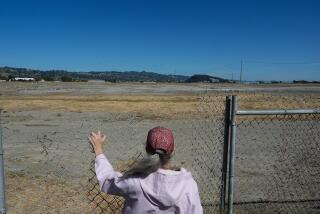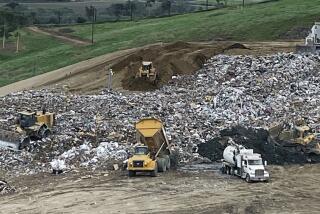Toxic waste dump ruled out as cause of Kettleman City birth defects
- Share via
State health investigators have ruled out a toxic waste dump as the cause of severe birth defects including heart problems and facial deformities in the impoverished Central California farming community of Kettleman City, according to a draft report released Monday.
Beyond narrowing their list of potential causes, state Environmental Protection Agency and Department of Public Health investigators were still unsure why 11 babies were born with physical deformities in Kettleman City between September 2007 and March 2010. Three of the babies died.
Tests of water, air and soil; analysis of pesticides; and interviews with six of the affected families did not suggest a common cause for the health problems.
“While we wish there was an explanation for what caused the birth defects experienced by the children we studied in Kettleman City,” state Department of Public Health Director Mark Horton said in a statement, “our investigation finds that no common health or environmental factor links the cases.”
The 160-page report did not satisfy the residents of the community of 1,500 just off Interstate 5 between Los Angeles and San Francisco. They and environmentalists wanted an answer to what was responsible for the birth defects in the community that for decades has endured agricultural sewage, diesel exhaust, pesticides and elevated levels of arsenic in drinking water.
Some still suspect that the medical problems were somehow linked to the nearby Waste Management Inc. hazardous waste facility, the largest landfill of its kind west of Louisiana and the only one in California licensed to accept cancer-causing polychlorinated biphenyls, or PCBs.
“We’re very, very disappointed. The state left us with a monster on the loose in town, and we don’t know when it will strike next,” said Maricela Mares Alatorre, a spokeswoman for a Kettleman City environmental group called People for Clean Air and Water.
“I always expected a whitewash,” said Bradley Angel, executive director of the environmental organization Greenaction. “State investigators didn’t test blood or tissue samples or even look for pesticides inside peoples’ homes.”
Waste Management officials were reassured by the report. “We are pleased with it. We think it speaks for itself,” said Jennifer Andrews, a spokeswoman for the company. “It supports decades of monitoring and scientific studies showing that the facility is safe and protective of human health and the environment.”
Health investigators analyzed the state’s registry for the rates of birth defects from 1987 to 2008 and reviewed case histories of the 11 babies born with major defects, including cleft palates and lips. Three of the 11 mothers declined to be interviewed by investigators, and two could not be reached.
Although more children were born with birth defects in 2008 and 2009 than would be expected for a population of Kettleman City’s size, investigators found no clear trend that could be explained by exposure to environmental pollution.
An examination of cancer rates for the census tract that includes Kettleman City found five cancer cases diagnosed among children younger than 15 during a 12-year period, two more than would be expected. Most of the childhood cancers were acute lymphocytic leukemia and all occurred in areas of the census tract outside of Kettleman City.
“While overall cancer rates in the area are lower than what would be expected based on statistical averages,” Horton said, “we will continue to monitor cancer activity, especially childhood cancers.”
Although health investigators generally found pollution levels in Kettleman City to be similar to those elsewhere in the San Joaquin Valley, Joan Denton, director of the state Office of Environmental Health Hazard Assessment, recommended several steps to address dangerous chemicals detected in the community’s water system.
Denton recommended that state regulatory agencies investigate benzene emissions at a treatment unit at a Kettleman City drinking water well and levels of lead detected in the local elementary school’s wells. She also recommended that the city reduce arsenic levels in local drinking water either through improved treatment or development of a new source of water.
“This will reduce risks of other health effects related to arsenic,” she said. “Current levels are not high enough to indicate birth defects.”
Upgrading the community water system cannot happen soon enough for Kettleman City resident Maura Alatorre, whose 2-year-old son, Emmanuel, is missing part of his brain and cannot keep his balance. “We need all the help we can get,” she said. “I’m saddened that the state failed to come up with a reasonable explanation for what happened. I will not stop fighting for an answer that makes sense.”
Waste Management has requested permits to expand the facility. State officials said a final decision on whether to grant the request will not be made until after completion of a final report on the investigation into the birth defects later this year.
More to Read
Sign up for Essential California
The most important California stories and recommendations in your inbox every morning.
You may occasionally receive promotional content from the Los Angeles Times.











